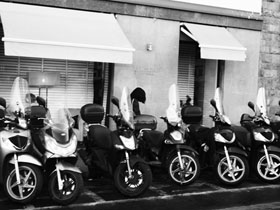
I am about to make a bold claim—that for ECLA’s Italy trip, the experience is much sweeter in hindsight.
Our professors warned us that the trip was no spring vacation, and rightly so. I believe I recited several litanies of complaints along the way to Florence and in the city itself: about the inhumane 3a.m. wake-up call to leave for Schoenefeld Airport, countless hours sitting in a bus, the packed daily schedule, hordes of tourists (as if I weren’t one myself), limited internet access, expensive meals, brusque museum personnel, horse dung, excruciatingly long walks on cobblestone streets, and even longer treks up a hill to San Miniato or the Cathedral’s bell tower, either which might have qualified as experiences in which Florence literally “took my breath away.” For eight days, I hustled, pushed, looked, talked, listened, pouted, thought, and plodded, until I finally dropped dead on a narrow hotel bed at sundown.
It should be no surprise that everything sped by, with hardly any time to fully digest information or to entertain whims of adventure in an old, historic Italian city. I know I ought to talk more about visits to churches and museums or the usually entertaining and very informative discussions conducted by professors, but I have no desire to, at least not at the moment.
I have a whole semester to look forward to before being able to speak substantially about Florentine Renaissance. By its end, I hope to acquire the confidence, and of course the understanding, to back up what I have to say.
What made the trip memorable were oddities—incredulous and inappropriately hilarious events, which somehow bridged moments between being glared at or shushed by on-site guards and standing in awe of the surroundings. I guess this should not have been entirely beyond my expectations, having heard about the annual excursion’s history. From last year’s unexpected volcanic eruption to this year’s airline strike precisely before our flight to Rome, the trip seems to have a tendency to be entangled in misadventures.
The first survival tip I learned is that there is strength in numbers. The only way to see a sculpture or that marvelous Baptistery door is to have a bunch of students moving in a coordinated direction to take up as much space as possible in front of the artwork, shoving aside enterprising tour guides who become irate at being prevented from feeding (mis-) information to uninterested middle school kids or starry-eyed septuagenarians.
There is also the option of getting up and walking around very early, which I did once at the suggestion of a friend. We found that at 6 am, the city, as well as its residents, was friendlier. The Piazza del Duomo seemed to have been drained of people, and only a road sweeper could be seen. The vehicle went buzzing around the piazza and washed the pavements—a 21st century invention for a 12th century edifice. The streets on the way to Ponte Vecchio were lined with muted motorcycles, and the famed bridge’s shops were locked up.
Without vehicles eager to run us over, my friend and I felt Florence stir, pregnant with its ancient secrets but still a living, breathing city. It is not so much the aversion to people that makes the crowds menacing but the sense that every day, millions of people pay to pry those secrets open, until what becomes of Florence is a gallery of stone and flesh, held together by the desire to make monuments to a romantic notion of the past, and in the process, to make money out of it. I know that is a pretty heavy indictment, but then, I would be at a loss too, if I had in my purview a city that was very much part of Western civilization’s development.
Hijinks also abound on the Italy trip. Some of ECLA’s grown men seemed to revert into little rascals. From administrators being reprimanded by a priest for playing Frisbee on the churchyard to a classmate gleefully chasing after horses in the green fields of Villa Peyron, there is no shortage of activities which prove that boys will always be boys.
After Florence, we traipsed through Rome until our feet hurt. But for my part, nothing beat the joy of seeking out and then buying books in historic Italian towns. My friend and I scoured the city of Rome for bookshops of which we visited seven before reaching the beautiful district of Trastevere and discovering a cozy little shop of used books and VHS tapes.
If anything, the experience can be amplified by a good bargain, and perhaps none more serendipitous than one particular purchase I made in Florence, of an anthology of poems previously owned by a member of ECLA’s faculty. This has yet to be confirmed (if it were only a namesake), but I am not one to spoil a good mystery.
All in all, there is nothing quite like soaking up the bright Florentine sun.
by April Matias (1st year BA, Philippines)
